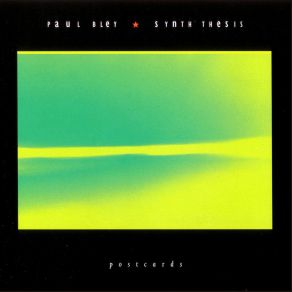Synth Thesis
Download links and information about Synth Thesis by Paul Bley. This album was released in 1994 and it belongs to Jazz, Avant Garde Jazz genres. It contains 14 tracks with total duration of 47:18 minutes.

|
|
|---|---|
| Artist: | Paul Bley |
| Release date: | 1994 |
| Genre: | Jazz, Avant Garde Jazz |
| Tracks: | 14 |
| Duration: | 47:18 |
| Buy it NOW at: | |
| Buy on iTunes $7.99 | |
| Buy on Amazon $12.06 | |
Tracks
[Edit]| No. | Title | Length |
|---|---|---|
| 1. | Gentle Man | 2:51 |
| 2. | Poetic License | 3:39 |
| 3. | Augmented Ego | 2:27 |
| 4. | Atir | 4:26 |
| 5. | Polygons | 6:34 |
| 6. | Shock Treatment | 1:51 |
| 7. | Cold Fusion | 3:56 |
| 8. | Fuzzy Logic | 1:19 |
| 9. | Still Life | 3:08 |
| 10. | Side Kicks | 2:18 |
| 11. | Major Attitude | 5:08 |
| 12. | Speed Trap | 2:14 |
| 13. | Out of Control | 4:16 |
| 14. | Real Magic | 3:11 |
Details
[Edit]This 1994 recording of Paul Bley playing piano and accompanying himself on synthesizers has long been a misunderstood part of his catalog. For many this was a sellout, a cheap experiment with technology. Few critics with this mindset — or Bley fans for that matter — seem to remember that, along with fellow Canadian Glenn Gould, Bley and his then-wife Annette Peacock were early champions of the analog Moog synthesizer. That Bley had, after many years, re-embraced an instrument he had a fondness for should have come as no surprise — especially given the man's championing of music video as a new possibility for jazz. Bley's spontaneous compositions on both instruments are no less beautiful, and no less canny or challenging, than anything else he's done. If listeners are bothered by the "physical" sound of the electronic device, then they should concentrate on the fact that the synthesizer is regarded as an accompanist and — in a Jetsons cartoon sort of way — is eerily similar to a vibraphone. It's clear from pieces such as "Augmented Ego," "Poetic License," and "Still Life" that Bley is interested in the various tonalities the synthesizer affords the timbral range of the piano. It clearly extends them beyond their pedal range and the acoustic confines of the room. They are alike in that they have keys, and that's all; there couldn't be two instruments more different in approach, and this is one of the things that no doubt attracts a musician like Bley. For him to be able to slur his chords across wide and narrow ranges while filling them microtonally with open spaces where notes cascade slowly from triads and clustered trills offers the opportunity for Bley to pursue that relentless muse he's been hot on the trail of for nearly 50 years. Finally, when the synthesizer plays the role of timbral foil and the piano becomes a modal fixture in an improvisation based on chromatic lyricism and its meditational variations, the open-minded listener is transported inside Bley's world of color and texture and outside the world of jazz as we know it. For evidence, listen once or twice to "Polygons," where the synth becomes a muted trombone and Bley's piano creates a contrapuntal harmony that frees up an entirely new melodic possibility in the interval. Misunderstood or just plain hated, Synth Thesis is one of Paul Bley's most provocative, challenging, and satisfying recordings of the '90s.